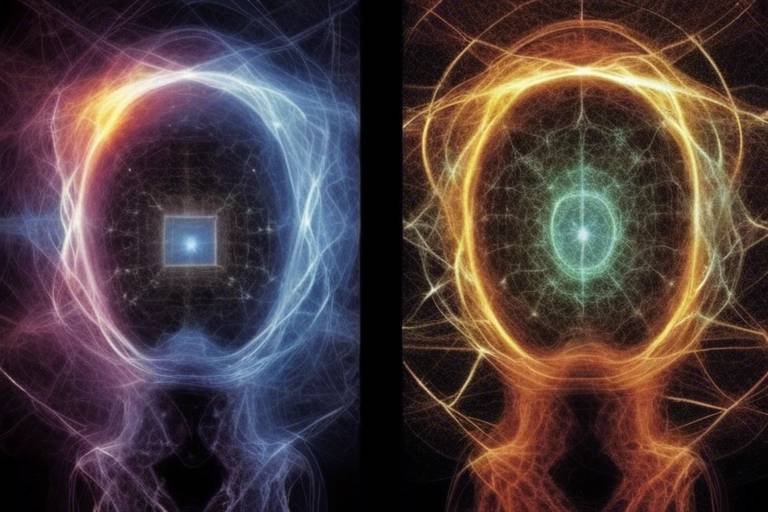Ontology - Deciphering the Structure of Reality
Ontology is a fascinating branch of philosophy that delves deep into the very fabric of existence. It poses profound questions about what it means to "be" and what constitutes reality. Imagine standing at the edge of a vast ocean, staring into the depths, trying to understand the unseen currents and the life beneath the surface. That's what ontology seeks to do—it explores the underlying structures that shape our understanding of the world around us.
At its core, ontology examines the nature of being and existence. It invites us to ponder questions like: What is real? What entities populate our universe? Are there different kinds of existence? These inquiries are not just academic; they touch on our everyday experiences and perceptions. For instance, when we interact with a friend, we are engaging with a complex entity that embodies both physical presence and abstract qualities, such as emotions and thoughts.
Throughout history, ontology has evolved, influenced by various philosophical movements and thinkers. From the ancient musings of Aristotle, who laid the groundwork for categorizing existence, to contemporary discussions that challenge traditional views, ontology has continually adapted. This evolution reflects our changing understanding of the universe and our place within it.
As we navigate through this article, we'll explore key concepts in ontology, including entities, existence, and the categories of being. We'll also dive into how modern philosophy has expanded the scope of ontology, particularly through existentialism and analytic philosophy. Finally, we'll uncover the practical applications of ontology in fields like science and information systems, illustrating how these philosophical principles are relevant in our digital age.
So, buckle up as we embark on this intellectual journey to decipher the intricate structure of reality through the lens of ontology. Together, we'll uncover the philosophical treasures hidden beneath the surface of what we often take for granted in our daily lives.
- What is ontology? Ontology is the philosophical study of the nature of being, existence, and the categories of being.
- Who are the key figures in ontology? Notable figures include Aristotle, Immanuel Kant, and contemporary philosophers like Martin Heidegger.
- How does ontology apply to modern science? Ontology helps clarify concepts and categories, enhancing understanding and communication in scientific inquiry.
- What is the difference between physical and abstract entities? Physical entities are tangible objects, while abstract entities include concepts like numbers and ideas.

[Historical Background of Ontology]
Understanding the origins of ontology requires a deep dive into its historical development, tracing back to ancient philosophers who laid the groundwork for our modern comprehension of existence. The term itself, derived from the Greek words "onto" meaning being and "logia" meaning study, reflects a profound inquiry into the nature of being. The journey begins with Aristotle, who is often regarded as the father of ontology. In his seminal work, the "Metaphysics," he posited that the study of being is the most fundamental aspect of philosophy. Aristotle distinguished between substance and accident, providing a framework that continues to influence ontological discourse today.
Fast forward to the medieval period, where thinkers like Thomas Aquinas integrated Aristotelian ontology with Christian theology, arguing that existence itself is a reflection of divine creation. This synthesis sparked debates about the nature of existence—whether it is inherent or bestowed by a higher power. The Enlightenment brought a shift with philosophers such as René Descartes, who famously declared, "I think, therefore I am," emphasizing the role of consciousness in establishing existence. This period marked a significant pivot towards a more subjective interpretation of being, setting the stage for later existential inquiries.
In the 19th and 20th centuries, German idealism and the rise of existentialism further transformed ontological discussions. Thinkers like Georg Wilhelm Friedrich Hegel introduced the idea of a dynamic process of becoming, suggesting that reality is not static but constantly evolving. Meanwhile, existentialists such as Jean-Paul Sartre and Simone de Beauvoir focused on individual existence, freedom, and the subjective experience of being, challenging traditional ontological perspectives that prioritized objective reality.
Today, ontology is not confined to philosophy alone; it has expanded into various fields, including computer science and artificial intelligence, where it helps in structuring knowledge and enhancing data interoperability. This evolution reflects the ongoing relevance of ontological inquiries in addressing contemporary challenges. The historical journey of ontology illustrates a rich tapestry of thought, where each philosopher contributed unique insights that continue to shape our understanding of reality.
As we navigate through this complex landscape, it becomes clear that ontology is not merely an academic pursuit; it is a vital lens through which we can explore the very fabric of existence itself. The questions it raises about what it means to be, the nature of reality, and our place within it remain as pertinent today as they were in the times of Aristotle and Aquinas.

[Key Concepts in Ontology]
Ontology, at its core, is the philosophical study of being and existence. It seeks to answer some of the most profound questions about what it means to exist and what kinds of entities populate our reality. To truly grasp ontology, one must delve into several key concepts that serve as the foundation of this intricate field of study. These concepts include entities, existence, and categories, each playing a crucial role in shaping our understanding of reality.
At the heart of ontology are entities, which can be defined as anything that exists, whether tangible or intangible. This distinction is important because it allows philosophers to categorize and analyze different types of existence. For instance, physical entities are those that have a material presence, like a tree or a car, while abstract entities include concepts such as love, justice, or even mathematical numbers. Understanding these distinctions helps us navigate the complex landscape of existence and the various forms it can take.
The relationship between entities and existence is a fundamental aspect of ontology. Entities can be divided into two primary categories: physical and abstract. Physical entities are the objects we interact with daily; they are the stuff of our world. In contrast, abstract entities challenge our perceptions, as they cannot be touched or seen in the same way physical objects can. This dichotomy raises intriguing questions about the nature of reality. Are abstract entities as real as physical ones, or are they merely constructs of the human mind?
Physical entities are the building blocks of our material world. They encompass everything from the smallest particles to the largest celestial bodies. In ontology, understanding how we categorize these entities is essential. For example, consider the following table that illustrates different types of physical entities:
| Type of Entity | Description |
|---|---|
| Natural Objects | Entities that occur in nature, such as trees, rocks, and rivers. |
| Artificial Objects | Entities created by humans, including buildings, vehicles, and tools. |
| Living Organisms | Entities that exhibit life, such as animals, plants, and microorganisms. |
Each of these categories helps us make sense of our physical surroundings and provides a framework for further exploration in ontology.
On the other hand, abstract entities present a unique challenge in ontological discussions. Unlike physical entities, abstract entities do not have a tangible form. They include concepts like numbers, ideas, and emotions. Think of abstract entities as the invisible threads that connect our understanding of the world. For example, the concept of justice is not something you can hold in your hand, yet it profoundly impacts our society and personal lives. This raises the question: How do we validate the existence of something that cannot be seen or touched?
In grappling with abstract entities, philosophers often engage in debates about their ontological status. Are they merely linguistic constructs, or do they possess a form of existence independent of human thought? This ongoing dialogue enriches our understanding of reality and challenges us to consider the implications of our beliefs about existence.
Another crucial aspect of ontology is the idea of categories of being. These categories help us organize our understanding of existence and the various forms it can take. By categorizing entities, we can better analyze their relationships and interactions. For instance, we might group entities based on their properties, functions, or even their roles in different contexts.
Categories of being can be thought of as the folders in a filing cabinet, each holding different types of information about existence. This organizational structure not only aids in philosophical discussions but also influences scientific inquiry and everyday reasoning.
In conclusion, the key concepts of ontology—entities, existence, and categories—are fundamental to our understanding of reality. By exploring these ideas, we can better appreciate the complexities of existence and the philosophical debates that arise from them. Whether we are discussing the physical world, abstract concepts, or the categories that bind them, ontology invites us to question our assumptions and expand our understanding of what it means to be.
- What is ontology? Ontology is the philosophical study of being and existence, exploring what entities exist and their relationships.
- What are physical and abstract entities? Physical entities are tangible objects, while abstract entities are concepts or ideas that do not have a physical form.
- Why are categories of being important? Categories of being help organize our understanding of existence and facilitate discussions about the nature of reality.

[Entities and Existence]
When we dive into the realm of ontology, one of the first things we encounter is the concept of entities. But what exactly are entities, and how do they relate to existence? At its core, an entity is anything that can be said to exist. This can range from a physical object, like a tree or a car, to more abstract concepts, such as love or justice. Understanding this distinction is crucial because it shapes how we perceive and categorize the world around us.
To clarify, we can break entities down into two primary categories: physical entities and abstract entities. Physical entities are the tangible things we can see and touch. They form the backbone of our everyday experiences. Think about the chair you’re sitting on or the smartphone in your pocket; these are all physical entities that occupy space and have a material presence. In contrast, abstract entities are less straightforward. They don’t have a physical form but still hold significance in our understanding of reality. For example, concepts like numbers, ideas, and emotions are all abstract entities that influence our lives and interactions.
Now, let’s explore physical entities a bit further. When we observe a physical entity, we engage with it through our senses. We can measure it, categorize it, and even manipulate it. This interaction is fundamental to scientific inquiry. For instance, in physics, we study the properties of matter—mass, volume, and density—allowing us to understand the universe's workings. In ontology, the way we classify these physical entities can lead to profound implications about our understanding of existence itself. Here’s a quick comparison of physical and abstract entities:
| Type of Entity | Characteristics | Examples |
|---|---|---|
| Physical Entities | Tangible, measurable, occupy space | Chair, tree, car |
| Abstract Entities | Intangible, conceptual, exist in thought | Love, justice, numbers |
Moving on to abstract entities, these present a fascinating challenge within ontology. They are not bound by the physical laws that govern tangible objects. Instead, they exist in a realm of thought and perception. For example, consider the number three. It doesn't have a physical form, yet it represents a quantity that can be used to describe reality. Similarly, concepts like justice or freedom are abstract entities that shape our societal structures and moral frameworks. They influence how we think, behave, and interact with one another.
In essence, the distinction between physical and abstract entities is not just an academic exercise; it has real-world implications. How we categorize these entities can influence everything from scientific research to philosophical debates. It raises questions about the nature of reality itself: Are abstract entities as "real" as physical ones? Can we trust our perceptions of the physical world when our understanding of abstract concepts is so fluid? These questions are at the heart of ontological discussions and challenge us to think deeply about what it means to exist.
In conclusion, entities are the building blocks of our understanding of existence. By examining the characteristics and implications of both physical and abstract entities, we can gain a clearer picture of reality. This exploration not only enriches our philosophical inquiries but also enhances our everyday experiences. So, the next time you encounter an entity—be it a solid object or a fleeting thought—take a moment to ponder its significance in the grand tapestry of existence.
- What is the difference between physical and abstract entities? Physical entities are tangible and measurable, while abstract entities are conceptual and exist in thought.
- Why are abstract entities important in ontology? They challenge our understanding of reality and influence our perceptions and interactions.
- Can entities exist without being perceived? This is a philosophical debate; some argue that entities exist independently, while others believe perception plays a crucial role.

[Physical Entities]
When we talk about physical entities, we're diving into the realm of the tangible—those things we can see, touch, and interact with in our everyday lives. Think about it: everything from a simple rock to a complex machine qualifies as a physical entity. These entities form the backbone of our understanding of reality because they are the building blocks of our physical world. But what exactly makes something a physical entity? Is it just about being made of matter, or is there more to the story?
In ontology, physical entities are often categorized based on their properties and relationships to one another. For instance, we can group them into different categories such as living organisms, inanimate objects, and even celestial bodies. Each of these categories carries its own set of characteristics and implications. For example, a tree is a living entity that interacts with its environment in ways that a stone does not. This distinction is crucial, as it helps us understand not only what exists but also how these entities relate to one another within the larger framework of existence.
One fascinating aspect of physical entities is how they are perceived. Our senses play a pivotal role in how we interact with the world around us. We rely on sight, sound, touch, taste, and smell to identify and categorize physical entities. However, our perception can sometimes be deceptive. For instance, consider an optical illusion; it tricks our brain into seeing something that isn't there or misinterpreting what we see. This raises intriguing questions about the nature of reality: if our perceptions can be flawed, how can we be sure of the existence of physical entities? This is where ontology steps in, providing a framework to analyze and understand these complexities.
Moreover, the study of physical entities often leads us to explore their interactions and relationships. For instance, in physics, we study how objects interact through forces like gravity and electromagnetism. These interactions are not just abstract concepts but are vital in understanding the behavior of physical entities in our universe. To illustrate this, consider the following table that summarizes some key characteristics of different types of physical entities:
| Type of Entity | Characteristics | Examples |
|---|---|---|
| Living Organisms | Biological processes, growth, reproduction | Plants, animals, humans |
| Inanimate Objects | Non-living, do not grow or reproduce | Rocks, furniture, vehicles |
| Celestial Bodies | Massive and often distant, influenced by gravitational forces | Stars, planets, asteroids |
Understanding physical entities is not just an academic exercise; it has real-world implications. For instance, in fields like engineering and architecture, knowledge about physical entities informs design and construction practices. Engineers must consider the properties of materials—like strength, flexibility, and weight—when creating structures that are safe and functional. Similarly, architects must understand how physical entities interact within a space to create environments that are both aesthetically pleasing and sustainable.
In conclusion, physical entities are more than just objects occupying space; they are integral to our understanding of reality. They challenge our perceptions, influence our interactions, and are foundational to various disciplines. As we continue to explore the depths of ontology, the study of physical entities will remain a crucial aspect of our quest to decipher the structure of reality.
- What are physical entities? Physical entities are tangible objects that exist in the physical world, such as living organisms, inanimate objects, and celestial bodies.
- How do we categorize physical entities? Physical entities can be categorized based on their properties, relationships, and interactions within the environment.
- Why is the study of physical entities important? Understanding physical entities helps us comprehend the nature of reality, informs various fields like science and engineering, and enhances our interactions with the world.

[Abstract Entities]
When we think about the world around us, our minds often gravitate towards what we can see, touch, and feel—those physical entities that populate our everyday lives. However, lurking beneath the surface of our tangible reality are abstract entities, which are just as crucial for understanding the fabric of existence. These are the concepts, ideas, and relationships that we cannot physically grasp but that shape our understanding of the world in profound ways.
Abstract entities encompass a wide range of elements, including numbers, theories, emotions, and even moral values. For instance, consider the concept of "freedom." While we cannot touch or see freedom, it influences our actions, decisions, and societal structures. This raises intriguing questions: How do we classify something that is not physically present? What role do abstract entities play in our understanding of reality?
One of the key challenges in ontology is to articulate the nature of these abstract entities. Unlike physical entities that can be observed and measured, abstract entities often exist in a realm of ideas and interpretations. They are like shadows in a room—unseen yet undeniably present, shaping the contours of our perceptions and thoughts. To illustrate this, let’s look at a few examples of abstract entities:
- Mathematical Concepts: Numbers and equations, such as the concept of "infinity," exist independently of physical manifestations but are fundamental to science and logic.
- Theories: Scientific theories like gravity or evolution are constructed from abstract reasoning and evidence, guiding our understanding of the universe.
- Emotions: Feelings like love, anger, or joy cannot be quantified yet profoundly affect human behavior and relationships.
- Moral Values: Concepts of right and wrong, justice, and ethics are abstract yet form the foundation of societal norms and laws.
In ontological discussions, the existence and implications of abstract entities often spark heated debates. Some philosophers argue that abstract entities are merely linguistic constructs, while others maintain that they possess a form of existence that is just as real as physical entities. This dichotomy invites us to ponder deeper questions about the nature of reality itself: Are abstract entities merely reflections of our thoughts, or do they exist independently of our minds?
Furthermore, the implications of abstract entities extend beyond philosophy and into practical realms. For instance, in computer science and artificial intelligence, understanding abstract entities is crucial for developing algorithms that can interpret and process human language, emotions, and ethical considerations. The ability to categorize and manipulate these abstract concepts can lead to advancements in technology that mimic human understanding, blurring the lines between human cognition and machine intelligence.
In conclusion, abstract entities represent a vital area of study within ontology, challenging our perceptions of existence and reality. They remind us that not everything that matters is visible or tangible. Just as a painter uses abstract forms to convey emotion and depth in their work, our understanding of the world is enriched by the recognition of these elusive yet essential constructs. As we continue to explore the nature of being, embracing the complexity of abstract entities will be key to unlocking new dimensions of understanding.
Q1: What are abstract entities?
A1: Abstract entities are concepts, ideas, and relationships that cannot be physically observed but significantly influence our understanding of reality.
Q2: How do abstract entities differ from physical entities?
A2: Physical entities are tangible objects that can be seen and touched, while abstract entities exist in the realm of ideas and cannot be physically grasped.
Q3: Why are abstract entities important in ontology?
A3: They challenge our perceptions of existence and help us understand the complexities of reality beyond the physical world.
Q4: Can abstract entities have real-world applications?
A4: Yes, they play a crucial role in fields like computer science, artificial intelligence, and ethics, influencing how we interact with technology and society.

[Categories of Being]
When we delve into the categories of being, we're essentially trying to untangle the intricate web of existence itself. Think of it like sorting out a box of assorted toys; each toy has its own unique characteristics, yet they all belong to the broader category of 'toys.' Similarly, in ontology, categorizing being helps us make sense of the vast array of entities that populate our reality.
At the heart of this categorization are fundamental distinctions that shape how we perceive existence. For instance, we can broadly classify beings into concrete and abstract categories. Concrete beings are those that we can interact with physically, like a tree or a car, while abstract beings include concepts like love or justice, which exist in a more intangible realm. This distinction not only aids in understanding but also invites us to ponder deeper questions: What does it mean for something to exist? Does existence require physical presence, or can abstract concepts hold just as much weight?
Moreover, categories of being can be further broken down into various ontological frameworks. These frameworks provide a lens through which we can analyze and interpret existence. Here’s a brief overview of some key categories:
| Category | Description |
|---|---|
| Physical Entities | These are tangible objects that occupy space and can be perceived through the senses. |
| Abstract Entities | These include ideas, concepts, and relationships that do not have a physical form. |
| Universal Entities | These are general concepts that apply to multiple instances, like species or categories. |
| Particular Entities | These refer to specific instances, such as a particular dog or a unique tree. |
Understanding these categories is crucial, as they influence our philosophical debates and everyday thinking. For example, when we talk about moral values, we often grapple with whether they are universal truths or merely subjective interpretations. This brings us to the question of whether abstract entities can hold the same significance as physical ones. Can a concept like 'freedom' be as real as a physical object like a chair?
As we navigate through these categories, we also encounter various philosophical positions that challenge and enrich our understanding. Some philosophers argue for a more layered ontology, suggesting that existence isn't just binary but rather exists on a spectrum. This perspective encourages us to consider how different categories might overlap or interact, much like how colors blend on a painter's palette.
Ultimately, the categories of being serve as a foundational framework for exploring existence. They not only help us organize our thoughts but also encourage us to ask profound questions about the nature of reality itself. By dissecting these categories, we gain insight into what it truly means to exist in a world filled with both tangible and intangible elements.
- What is the significance of categorizing beings? Categorizing beings helps us understand the complexities of existence and facilitates philosophical discussions.
- Are abstract entities considered real? Yes, abstract entities like concepts and ideas are considered real in the context of their impact on human thought and behavior.
- How do categories of being influence philosophical debates? They provide a framework for discussing different perspectives on existence, allowing for deeper exploration of subjects like morality and identity.

[Ontology in Modern Philosophy]
Modern philosophy has propelled ontology into new realms of thought, transforming it from a mere exploration of being into a vibrant field that intersects with various disciplines. The evolution of ontological discussions has led to a variety of theories that challenge traditional notions of existence. Think of ontology as a vast ocean; as we dive deeper, we discover myriad currents and depths that shape our understanding of reality. So, how have contemporary thinkers approached ontology, and what implications do their ideas hold for us today?
One of the most significant developments in modern ontology is the rise of existentialism, which places the individual at the center of existence. Existentialist philosophers such as Jean-Paul Sartre and Martin Heidegger redefined ontology by emphasizing the subjective experience of being. They argue that existence precedes essence, meaning that individuals first exist and then define their essence through actions and choices. This perspective invites us to ponder: What does it mean to truly exist? It's a question that resonates deeply in our quest for meaning in a seemingly chaotic world.
On the other hand, analytic philosophy approaches ontology with a focus on clarity and precision. Figures like Bertrand Russell and W.V.O. Quine have contributed significantly to this field by scrutinizing the language we use to discuss existence. They argue that our ontological commitments are reflected in our linguistic practices. For instance, when we say "unicorns do not exist," we are making a claim about the nature of existence that hinges on our understanding of what it means to be a unicorn. This leads us to ask: Are we limited by our language in how we conceive of reality? Such inquiries push the boundaries of traditional thought and encourage us to reconsider the frameworks we use to interpret the world around us.
Moreover, the interplay between existentialism and analytic philosophy has sparked rich debates within the philosophical community. While existentialists focus on the subjective experience of being, analytic philosophers emphasize the objective analysis of existence. This divergence highlights the multifaceted nature of ontology, where different perspectives can coexist and enrich our understanding. For instance, consider the following table that contrasts the two approaches:
| Aspect | Existentialism | Analytic Philosophy |
|---|---|---|
| Focus | Subjective experience | Language and logic |
| Key Thinkers | Jean-Paul Sartre, Martin Heidegger | Bertrand Russell, W.V.O. Quine |
| Core Idea | Existence precedes essence | Ontological commitments through language |
In conclusion, ontology in modern philosophy is a dynamic field that continues to evolve, reflecting our changing understanding of existence. By examining the contributions of existentialism and analytic philosophy, we gain insights into the complexities of being that resonate with our lived experiences. As we navigate this intricate landscape, we are reminded that the questions of existence are not just academic; they are profoundly personal and universal. So, what are your thoughts on the nature of reality? Are we merely observers, or do we actively shape our existence through our choices and beliefs?
- What is ontology? - Ontology is the philosophical study of being, existence, and the categories of being. It explores what entities exist and how they can be categorized.
- How does modern philosophy view ontology? - Modern philosophy views ontology as a dynamic field that incorporates various perspectives, including existentialism and analytic philosophy, to explore the nature of existence.
- Why is ontology important? - Ontology is important because it helps us understand the fundamental nature of reality, influencing various disciplines such as science, information systems, and artificial intelligence.

[Existentialism and Ontology]
Existentialism, a philosophical movement that emerged in the late 19th and early 20th centuries, places a significant emphasis on individual existence, freedom, and choice. At its core, existentialism grapples with the question of what it means to be, and this inquiry is deeply intertwined with ontology—the study of being. Think about it: when we ponder our existence, we are not just asking if we exist, but why we exist and what it means to truly be alive. This is where the existentialists shine, as they invite us to confront the often uncomfortable realities of our own existence.
One of the most prominent figures in existentialism, Jean-Paul Sartre, famously declared that "existence precedes essence." This assertion suggests that individuals are not born with a predetermined purpose; rather, they must create their own essence through actions and choices. In this way, ontology becomes a deeply personal journey. It’s not just about categorizing beings or understanding their properties—it’s about recognizing that we, as individuals, have the power to define our own existence. This perspective can be both liberating and daunting, as it places the responsibility of meaning squarely on our shoulders.
Another key existentialist, Martin Heidegger, also made significant contributions to the relationship between existentialism and ontology. Heidegger's concept of "Being" (or "Sein") urges us to explore the nature of existence itself. He posits that humans are "thrown" into a world that is often indifferent to our desires and struggles. This idea introduces a sense of urgency to our existence; it compels us to confront our mortality and the fleeting nature of life. In this light, ontology is not merely an abstract philosophical exercise but a vital exploration of our lived experiences.
To further illustrate the intersection of existentialism and ontology, consider the following key themes:
- Authenticity: Existentialists advocate for living authentically, which means being true to oneself and making choices based on personal values rather than societal expectations. This authenticity is a central concern in ontological discussions, as it relates to the essence of being.
- Absurdity: The existentialists often highlight the absurd nature of life—our search for meaning in a universe that seems indifferent. This absurdity challenges traditional ontological views and invites a reevaluation of what it means to exist.
- Freedom and Responsibility: Existentialism emphasizes that with freedom comes the weight of responsibility. This notion plays a crucial role in understanding our being, as it underscores the significance of our choices in shaping our existence.
In conclusion, the relationship between existentialism and ontology is rich and complex. Existentialist thinkers challenge us to reflect on our own existence and the choices we make, while ontological inquiries provide the framework for understanding the nature of being itself. As we navigate the intricacies of life, these philosophical perspectives encourage us to embrace our freedom, confront our fears, and ultimately, define our own essence in a world that often feels chaotic and unpredictable.
Q: What is the main focus of existentialism?
A: Existentialism primarily focuses on individual existence, freedom, and the quest for meaning in a seemingly indifferent universe.
Q: How does existentialism relate to ontology?
A: Existentialism explores the nature of being and existence, emphasizing personal choice and responsibility, which are essential aspects of ontological studies.
Q: Who are some key figures in existentialism?
A: Prominent existentialists include Jean-Paul Sartre, Martin Heidegger, and Simone de Beauvoir, each contributing unique perspectives on the nature of existence.
Q: What does "existence precedes essence" mean?
A: This phrase, coined by Sartre, suggests that individuals are not born with a predetermined purpose; instead, they create their own essence through their actions and choices.

[Analytic Philosophy and Ontology]
Analytic philosophy, a movement that emerged in the early 20th century, has profoundly influenced the study of ontology. At its core, analytic philosophy emphasizes clarity, precision, and logical analysis—qualities that are essential when grappling with the complex nature of existence. Think of it as putting on a pair of glasses that sharpen your vision; suddenly, the blurry outlines of philosophical debates become clearer, allowing for a more nuanced understanding of what it means to be.
One of the key figures in this domain is Bertrand Russell, who challenged traditional ontological views by advocating for a more scientific approach to philosophical questions. Russell's work on definite descriptions and his analysis of language laid the groundwork for a more rigorous examination of existence. He believed that many ontological problems could be resolved by clarifying language and the way we talk about objects and their properties. In this sense, analytic philosophy acts as a tool, helping philosophers dissect and reconstruct arguments to reveal the underlying ontological assumptions.
Another significant contributor to this field is W.V.O. Quine, who famously questioned the distinction between analytic and synthetic truths. Quine argued that our understanding of existence is not merely a matter of logical deduction but is deeply intertwined with our experiences and empirical observations. His famous assertion that "to be is to be the value of a bound variable" encapsulates his ontological stance, suggesting that existence is tied to the roles entities play within our theoretical frameworks.
In modern analytic philosophy, ontological discussions often revolve around the debate between realism and anti-realism. Realists assert that entities exist independently of our perceptions or theories, while anti-realists argue that existence is contingent upon our conceptual frameworks. This dichotomy can be likened to a stage play: realists see the actors as existing outside the play, while anti-realists view them as mere constructs of the narrative. The implications of this debate are profound, influencing not only philosophical discourse but also fields like science and mathematics.
Furthermore, analytic philosophers utilize formal logic and set theory to explore ontological questions, allowing for a more structured approach to understanding existence. For instance, the use of modal logic enables philosophers to discuss possible worlds and the nature of necessity and possibility. This technique can help clarify whether certain entities are necessary for our understanding of the universe or merely contingent upon specific conditions.
As we delve deeper into the relationship between analytic philosophy and ontology, it becomes evident that this approach fosters a dynamic dialogue. Philosophers are encouraged to scrutinize their assumptions, refine their arguments, and engage with one another in a meaningful way. This process not only enriches our understanding of being but also highlights the importance of communication in philosophical inquiry.
In conclusion, analytic philosophy serves as a vital lens through which we can explore ontological questions. By prioritizing clarity and logical rigor, it challenges us to think critically about existence and the frameworks we use to understand it. As the debates continue to evolve, the interplay between analytic philosophy and ontology promises to yield new insights into the very fabric of reality.
- What is the main focus of analytic philosophy?
Analytic philosophy primarily focuses on clarity, precision, and logical analysis in philosophical discussions, often addressing issues related to language, meaning, and existence. - How does analytic philosophy differ from continental philosophy?
Analytic philosophy emphasizes logical rigor and clarity, while continental philosophy often explores broader existential and cultural themes, sometimes employing more abstract methodologies. - Who are some key figures in analytic philosophy?
Prominent figures include Bertrand Russell, W.V.O. Quine, and Saul Kripke, each contributing significantly to discussions on ontology and the philosophy of language.

[Applications of Ontology]
Ontology isn't just a theoretical exercise confined to the dusty halls of philosophy; it has real-world applications that significantly impact various fields. From science to information systems and even artificial intelligence, ontology serves as a foundational framework that helps us navigate the complexities of existence and categorization. Think of ontology as the blueprint of reality, providing a structured way to understand and organize the myriad entities and concepts we encounter daily.
In scientific inquiry, ontology plays a crucial role in clarifying concepts and ensuring that researchers are speaking the same language. For example, when scientists study a particular phenomenon, they must agree on the definitions of the entities involved. Without a clear ontological framework, misunderstandings can arise, leading to confusion and misinterpretation of data. By establishing a common ontology, researchers can facilitate better communication and collaboration, ultimately enhancing the quality of scientific research.
Moreover, ontology is instrumental in the realm of information systems. In today's digital age, where vast amounts of data are generated every second, organizing and retrieving information efficiently is paramount. Ontological principles help structure databases and information systems, ensuring that data can be categorized and accessed intuitively. For instance, in a healthcare database, an ontology might define categories for diseases, treatments, and patient demographics, enabling healthcare professionals to find relevant information quickly and accurately.
Additionally, the rise of artificial intelligence (AI) has further underscored the importance of ontology. AI systems rely on ontological frameworks to understand and process information. By using ontologies, AI can make sense of complex data sets, recognize patterns, and even engage in natural language processing. This capability is essential for developing intelligent systems that can interact with humans in meaningful ways. For instance, virtual assistants use ontological structures to understand user queries and provide relevant responses, making our interactions with technology more seamless.
To illustrate the diverse applications of ontology, let's take a look at a table that summarizes its impact across different fields:
| Field | Application of Ontology |
|---|---|
| Science | Clarifies concepts and enhances communication among researchers. |
| Information Systems | Structures databases for efficient data retrieval and organization. |
| Artificial Intelligence | Enables understanding and processing of complex data sets. |
| Healthcare | Facilitates quick access to relevant patient and treatment information. |
As we can see, the applications of ontology extend far beyond philosophical debates. They permeate various sectors, highlighting its relevance and importance in our everyday lives. By providing a structured approach to understanding existence, ontology empowers us to make sense of the world around us, bridging the gap between abstract concepts and practical applications.
- What is ontology? Ontology is the philosophical study of the nature of being, existence, and reality, focusing on the categorization of entities and their relationships.
- How is ontology used in science? In science, ontology helps clarify definitions and categories, ensuring that researchers have a common understanding of the entities they study.
- What role does ontology play in artificial intelligence? Ontology provides a framework for AI systems to understand and process complex data, enabling better interaction and decision-making.
- Can ontology improve data retrieval in information systems? Yes, by structuring data and defining categories, ontology enhances the efficiency and accuracy of data retrieval in information systems.

[Ontology in Science]
When we think about science, we often envision numbers, equations, and tangible experiments. However, underneath this empirical surface lies a fascinating layer of ontology that shapes how we understand the very essence of scientific inquiry. At its core, ontology in science is all about identifying and categorizing the fundamental entities that exist within our universe. It's like peeling back the layers of an onion to reveal the core truths about reality itself.
One of the primary roles of ontology in science is to provide a structured framework for understanding complex concepts. By defining what entities exist and how they relate to one another, scientists can communicate more effectively and minimize misunderstandings. For instance, consider the realm of biology. Here, ontological classifications help distinguish between various life forms, their characteristics, and their relationships within ecosystems. This clarity not only aids in research but also enhances educational efforts, allowing students and the public to grasp intricate biological concepts.
Moreover, ontology assists in the development of scientific theories. Theories often hinge on the existence of certain entities and the relationships between them. For example, in physics, the ontology of particles and forces lays the groundwork for theories like quantum mechanics and relativity. By establishing a clear ontological basis, scientists can build upon existing knowledge and explore new frontiers, pushing the boundaries of what we know about the universe.
In addition to its theoretical contributions, ontology also plays a crucial role in the realm of data science and informatics. With the explosion of data in the digital age, having a well-defined ontology is essential for organizing and retrieving information efficiently. Ontologies can help create standardized vocabularies that enhance data interoperability, making it easier for researchers to share and collaborate across disciplines. For instance, in medical research, ontologies help classify diseases, symptoms, and treatments, facilitating better data management and analysis.
| Field | Ontology Application | Example |
|---|---|---|
| Biology | Classification of life forms | Taxonomy of species |
| Physics | Theoretical frameworks | Quantum particles and forces |
| Information Science | Data interoperability | Medical ontologies |
In conclusion, ontology is not merely an abstract philosophical concept; it is a vital component of scientific practice that influences how we categorize, theorize, and understand the world around us. By providing clarity and structure, ontology enhances scientific communication and fosters collaboration, paving the way for groundbreaking discoveries. So, the next time you marvel at a scientific breakthrough, remember that there's a rich ontological framework supporting that achievement, helping to bridge the gap between what exists and what we can know.
- What is ontology in science? Ontology in science refers to the study of the nature of being and existence as it applies to scientific entities and their relationships.
- Why is ontology important in scientific research? It provides a structured framework for categorizing entities, enhancing communication, and facilitating better understanding of complex concepts.
- How does ontology influence scientific theories? Ontology helps establish the foundational entities and relationships that theories are built upon, guiding researchers in their inquiries.
- Can ontology improve data management? Yes, well-defined ontologies enhance data interoperability, making it easier to organize, share, and analyze information across various fields.

[Ontology in Information Systems]
In today's digital landscape, where information is generated at an unprecedented rate, ontology plays a crucial role in structuring and organizing data. Think of ontology as a blueprint for understanding the relationships and categories of information. It's like having a well-organized library where every book has its place, making it easier for readers to find what they need. In information systems, ontology helps in defining the structure of data, ensuring that different systems can communicate effectively, much like a common language that bridges gaps between various disciplines.
One of the primary benefits of using ontology in information systems is enhanced data interoperability. When different systems use a shared ontology, it becomes significantly easier to exchange and integrate data. Imagine trying to piece together a jigsaw puzzle where each piece has a different shape; without a common framework, it would be nearly impossible to see the whole picture. Ontologies provide that framework, allowing disparate systems to work together seamlessly. This is particularly important in fields like healthcare, where patient data must be shared across various platforms to ensure comprehensive care.
Furthermore, ontology aids in improving data retrieval processes. When users search for information, ontologies help refine search results by understanding the context and relationships between different data points. For instance, if someone searches for "heart disease," an ontology can help the system recognize related terms such as "cardiology," "treatment," or "symptoms," thus providing a more comprehensive set of results. This not only enhances user experience but also increases the efficiency of information systems.
In the realm of artificial intelligence, ontologies are indispensable. They enable machines to process and understand information in a more human-like manner. For example, consider how a virtual assistant like Siri or Alexa responds to queries. These systems rely on ontological structures to comprehend the intent behind user requests and to deliver accurate responses. Without ontology, these interactions would be much less effective, leading to frustration for users.
To illustrate the significance of ontology in information systems, here's a simple table summarizing its key applications:
| Application | Description |
|---|---|
| Data Interoperability | Facilitates seamless communication between different systems using a shared ontology. |
| Data Retrieval | Enhances search capabilities by understanding relationships between data points. |
| Artificial Intelligence | Enables machines to process and understand information contextually. |
| Knowledge Representation | Provides a structured way to represent complex information and knowledge domains. |
In summary, ontology is not merely an abstract concept; it is a practical tool that enhances the functionality and efficiency of information systems. By providing a structured framework for understanding data, ontologies enable better communication, retrieval, and processing of information. As we continue to advance in the digital age, the importance of ontology will only grow, making it a vital area of study for anyone involved in information technology and data management.
- What is ontology in information systems?
Ontology in information systems refers to a structured framework that defines the relationships and categories of data, facilitating better communication and understanding between different systems.
- How does ontology improve data interoperability?
By providing a common language and framework, ontology allows different systems to exchange and integrate data more effectively, reducing confusion and errors.
- Can ontology enhance search functionalities?
Yes, ontology improves search capabilities by recognizing the context and relationships between data points, leading to more relevant search results.
- Is ontology important for artificial intelligence?
Absolutely! Ontology enables AI systems to understand and process information in a way that mimics human comprehension, making interactions more natural and effective.
Frequently Asked Questions
- What is ontology?
Ontology is the philosophical study of being, existence, and the nature of reality. It examines what entities exist and how they can be categorized and related to one another. Think of it as the framework that helps us understand the building blocks of everything around us.
- How did ontology originate?
Ontology has roots in ancient philosophy, particularly with thinkers like Aristotle, who laid the groundwork for understanding existence. Over centuries, it has evolved, incorporating diverse perspectives from various philosophers, leading to contemporary discussions that shape our current understanding of reality.
- What are the key concepts in ontology?
Key concepts in ontology include entities, existence, and categories. Entities represent what exists, while existence refers to the state of being. Categories help us organize our understanding of different kinds of beings, making it easier to navigate complex philosophical debates.
- What is the difference between physical and abstract entities?
Physical entities are tangible objects we can perceive with our senses, like trees or cars. In contrast, abstract entities, such as numbers or ideas, do not exist in a physical form but are crucial for understanding concepts and relationships. Both types play significant roles in ontological discussions.
- How does ontology relate to modern philosophy?
Modern philosophy has expanded the scope of ontology by introducing new theories and critiques. Philosophers today explore how ontology intersects with various fields, including existentialism and analytic philosophy, each offering unique insights into the nature of existence.
- What role does ontology play in science?
In science, ontology helps clarify concepts and categories, which is essential for effective communication and understanding. By establishing a clear framework, ontology facilitates scientific inquiry, allowing researchers to categorize their findings and theories accurately.
- Can ontology be applied in information systems?
Absolutely! Ontology is crucial in structuring information systems, enhancing data interoperability and retrieval. In our digital age, having a well-defined ontology helps systems understand and process information more effectively, making it easier for users to access and utilize data.



















